
Guests
- Harmeet Singh Soodenone of the three members of the Christian Peacemaker Teams held hostage in Iraq. They were kidnapped on November 26, 2005 and held for 118 days before being freed by British and American forces on March 23, 2006.
- James Loneyone of the three members of the Christian Peacemaker Teams.
In a national broadcast exclusive, we speak with James Loney and Harmeet Singh Sooden, two of the three Christian Peacemaker Teams held hostage in Iraq for 118 days. They held a news conference in London today announcing they “unconditionally” forgive their captors. They have yet to decide whether to give evidence at the men’s trial, which is set for next year in Iraq. Singh Sooden and Loney discuss their ordeal and remember their murdered colleague, Tom Fox. [includes rush transcript]
Transcript
AMY GOODMAN: We move now to London, where three aid workers from the Christian Peacemakers Team, who had been held hostage in Iraq, held a news conference today. Norman Kember of Britain, Canadians Harmeet Singh Sooden and James Loney announced they “unconditionally” forgive their Iraqi captors and wish them no retribution. They have yet to decide whether to give evidence at the men’s trial, which is set for next year in Iraq.
In November of 2005, Loney, Sooden and Kember, part of the Christian Peacemakers Team delegation to Iraq, were kidnapped along with U.S. peace activist Tom Fox. Fox was also a full-time member of the Christian Peacemakers. He was working in Baghdad at the time. He was murdered on March 9, 2006. The remaining three were set free on March 23rd.
Throughout their ordeal, videotape of the prisoners was released periodically. On December 7, 2005, a video was released of Tom Fox and Norman Kember making this plea.
TOM FOX: I’d like to offer my pleas to the people of America, not to the government of America—a plea for my release from captivity and also a plea for a release from captivity of all the people of Iraq. We are all suffering from the same fate, and that is the occupation of the American troops and the British troops, which have brought me to this condition and has brought the Iraqi people to the condition they are in. So I would ask the people of America to do what they can to free us all from this captivity.
NORMAN KEMBER: I’m a Christian Peacemaker. I’m a friend of Iraq. I have been opposed to this war, Mr. Blair’s war, since the very beginning. I ask of him now, and the British government, to do all that they can to work for my release and the release of the Iraqi people from oppression.
AMY GOODMAN: Norman Kember and Tom Fox. A few days after their release, James Loney made this statement in London to the media.
JAMES LONEY: I sometimes entertain myself by imagining this day. Sometimes I despair of ever seeing it. Always I ache for it. And so, here we are. For 118 days I disappeared into a black hole, and somehow, by God’s grace, I was spit out again. My head is swirling, and there are times when I can hardly believe it’s true. We had to wear flak jackets during our helicopter transport from the international zone to the Baghdad airport, and I had to keep knocking on the body armor I was wearing to reassure myself that this was all really happening. It was a terrifying, profound, powerful, transformative and excruciatingly boring experience. Since my release, my rescue from captivity, I have been in a constant state of wonder, bewilderment and surprise, as I slowly discover the magnitude of the effort to secure our lives and freedom.
AMY GOODMAN: James Loney and Harmeet Singh Sooden have just held their news conference and come into the studio in London for this national broadcast exclusive. We welcome you both to Democracy Now!
I wanted to start with Harmeet Singh Sooden. Can you talk about why the three of you, the surviving Christian Peacemaker Team members of the hostage ordeal in Iraq, came together today in London?
HARMEET SINGH SOODEN: Well, we were recently approached by the authorities in our respective countries. We were told that they had captured four of our captors and that a trial would ensue, and they want us to testify. That’s the background.
AMY GOODMAN: And what is your response?
HARMEET SINGH SOODEN: Well, our current position is that we don’t have enough information to make a decision, and we’re hoping that that information will be provided for us and/or we can obtain that information from, you know, other sources.
AMY GOODMAN: James Loney, you and Harmeet, as well as Norman Kember, are calling for forgiveness for your captors. Talk further about your ordeal—we watched you right after you were released just now—and what it is you want to accomplish right now.
JAMES LONEY: Well, it was a grim 118 days. We suffered from the deprival of our freedom, and we were given very little food. We were in a constant state of fear and anxiety about what was going to happen to us. But, yes, it was an awful experience, but we really desire that we want good to come out of this. And we are very, very concerned that the death penalty is on the table for these men. They could face execution, and that would be the worst possible outcome for us.
We—you know, Bishop Tutu has this phrase, you know: There’s no future without forgiveness. And for us, forgiveness opens up possibilities. It opens up the future, that something different can happen than what happened in the past. And what happened in the past was—it was awful. And Tom was killed in that. And we want something different. We don’t want more people to be killed. We want the possibility of restoration and a justice that is about healing the relationships that have been broken.
AMY GOODMAN: James, can you talk about why you were in Iraq and how you came to know Norman Kember and Harmeet and Tom Fox, who was killed by his kidnappers?
JAMES LONEY: So, Tom Fox was a member of the CPT team working in Iraq, and I work for CPT and was leading a delegation that included Harmeet and Norman. We met up in Amman. And our purpose in going there was to learn about the realities of the occupation of Iraqi life from regular Iraqis, because this is a point of view that the mainstream media has not really been representing. And this is a war that’s been based on lies from the very beginning. So we wanted to go there and to learn for ourselves, see for ourselves, and to bring those stories back and to be part of the ongoing work of the Iraq team, which at that time was documenting torture in the Interior Ministry.
AMY GOODMAN: And how were you taken? How were you kidnapped?
JAMES LONEY: We were—it was right after a meeting. There was—a car basically was waiting for us. And when we pulled out, it stopped in front of us, and four men stormed the vehicle, and they had guns, and they pulled our translator and driver out of the vehicle. And that was it. We were kidnapped.
AMY GOODMAN: Harmeet Singh Sooden, could you take it from there? Where were you taken then?
HARMEET SINGH SOODEN: We were driven for about 20 minutes to half an hour. We were taken to the, what we call the first house. We were sort of driven around the same spot twice, at least. I wasn’t really paying attention to our surroundings, and more the people who had abducted us. We were brought in, and the man who became our handler or manager was there. We were basically—they took our stuff. We were handcuffed, blindfolded, and basically moved into a room. And that’s how it remained for about a week, until Tom Fox and Norman were separated from us. We actually feared the worst for a while, but a week later, we were reunited with them in the second house. And that’s when the long haul began basically.
AMY GOODMAN: In that second house, is that where you were held for more than a hundred days?
HARMEET SINGH SOODEN: That’s correct. That’s approximately correct, yeah.
AMY GOODMAN: When was your last moment with Tom Fox?
HARMEET SINGH SOODEN: It was February the 12th. We thought we were all going back to the first house to be released, and they took Tom first. I believe I was the last of the three to speak to him. I just said, “See you soon,” and gave him a hug, and he left.
AMY GOODMAN: What can you tell us about Tom and about your experience in captivity with him, Harmeet?
HARMEET SINGH SOODEN: I was—I think I was the person handcuffed to him the longest, every night and on most days. He was committed to nonviolence. If there was a possibility of escape, he said he would not use any form of violence to escape. We would hear car bombs or explosions in the distance, and he would pray for the victims, and even the perpetrators. That should give you a good idea of what kind of person he was.
AMY GOODMAN: Now, you’re calling, Harmeet, for forgiveness. You’re calling for the greatest leniency for the men who will be tried. Do you know who has been arrested at this point?
HARMEET SINGH SOODEN: Well, we’ve been told four people have been arrested. We’ve been given their names. Unfortunately, that means very little at this point. We need more information before we can make any sort of decision about testifying or not testifying. That’s the current position we’re in.
AMY GOODMAN: What is the information you’re looking for?
HARMEET SINGH SOODEN: Well, there are a few specific things. One would be the trial date. The other would be the location, the process itself. Just things of that nature.
AMY GOODMAN: Can you tell us about your captors? Who were they? What particular group, or were they with a particular group?
HARMEET SINGH SOODEN: Well, we don’t have much information on that. But in terms of who they were, what we saw, we had given them nicknames. There was “Uncle.” He claimed to be a former POW guard in the Iran-Iraq War. He was quite confident and sort of treated us like his crops. He said he was also a farmer.
There was another younger man in his mid-twenties. We called him “Junior.” He was very volatile, appeared to be traumatized. He said that his family, some siblings and his fiancée, were killed in Fallujah when his house was bombed.
And there was another person we called “Nephew.” He was quite unsure of himself, as if he hadn’t done this before. And he said his house was destroyed in Fallujah, as well, and he was a father of five. He hadn’t told his family what he was doing, and he didn’t know who his, I guess, his chief was or who the leaders of his group were.
AMY GOODMAN: And did they tell you—
HARMEET SINGH SOODEN: Then there was a manager, of course.
AMY GOODMAN: And the manager, what?
HARMEET SINGH SOODEN: We called him “Medicine Man.” He was very slick, a very good, I guess, talker, and he did his job well, I guess, from that point of view. He was always well-dressed. He seemed to be highly educated. And there was another man whose face we couldn’t see. He was quite—spoke English reasonably well and seemed to understand the Western viewpoint, in terms of the occupation. He understood the plight. For example, he told us once he was in an operation where he killed an American soldier who was probably 20 or 21 years old, and he commented on his beautiful face. And he asked—well, he retorted, “Why did he have to die for an education?”
AMY GOODMAN: And did they deal with Tom Fox, the only American in your group—you and James are Canadian, Norman Kember is British—differently than the three of you, before he was killed?
HARMEET SINGH SOODEN: Junior definitely treated Tom with more disdain. I do recall one incident, which is sort of blanked out in my—well, I remember the surrounding situation, of course. Norman and Jim have filled me in. Medicine Man basically pointed his gun at him and said, “You’re the devil. And if you try to escape, we will kill you.” And I, at the time, thought that this was just a tactic to control us and keep us in line, basically. I’m not sure why they thought Tom was the mastermind of escape, because, in fact, he was most opposed to escape through violent means, anyway.
AMY GOODMAN: Why do you think they killed Tom Fox?
HARMEET SINGH SOODEN: I do not know why someone had to be killed, but obviously an American national would be the most likely in this situation to be killed if someone had to be killed.
AMY GOODMAN: And when did you learn that Tom was killed?
HARMEET SINGH SOODEN: Tom’s body, I believe, was found on March the 9th—on March the 7th. Since the separation, since he was separated from us, we would keep asking how he was, and we were told he was OK. But two days before his body was found, we were told that they were going to announce that he has been killed to the world, but that would just be a ruse to try and—there were some secret negotiations apparently going on for a prisoner exchange in the U.S. That was the story that was put forward.
Two days later, we were—at that point we were allowed an hour or two of TV a night. And it was on a news channel, an Arabic news channel, and we saw Tom, a clip of Tom with a camera zooming in on him and then a shot of a street. And it’s at that point we suspected that perhaps he had actually been killed. And this was March the 11th. We only knew for sure when we were released.
AMY GOODMAN: James Loney, you’re calling for forgiveness for your captors. Do you believe that they should be tried? Do you believe that they should be punished in any way, if found guilty?
JAMES LONEY: I, myself, have no desire for punishment. That means nothing to me. That won’t restore or repair anything. Iraqi society has an interest in this matter and has an interest in law and order and security for citizens there. The concern is, is that there is the death penalty. There is a real lack of transparency. Time magazine reported, you know, unofficially 90 executions, the names of the people and the details of their crimes are not available. There is a lack of transparency around this.
And I am concerned that—about that aspect of it, but also that the death penalty is part of this spiral of violence, you know, of actions and reactions to violence that lead ultimately to self-destruction. That is the logic of violence. And we went to Iraq to speak about peace and to speak about a different way of being in the world, and we—I believe that forgiveness gives us this opportunity to imagine a different kind of future.
Now, I know we are—there are—you know, we’re working with reality. You know, we don’t have the kinds of institutions and systems in place that might facilitate a restorative justice kind of outcome. But nevertheless, it is important that at least there be some basic level of clemency, I feel, in this situation. I think that there is a legitimate—punishment, in and of itself, for me has no legitimacy, but if there is a need to protect society by withholding someone’s liberty for a period of time, in the interest of protecting society and in the interest of perhaps facilitating some kind of rehabilitation or restoration, that would have some legitimacy or some purpose. But punishment, in and of itself, for me, does not.
AMY GOODMAN: We’re talking to James Loney and Harmeet Singh Sooden, two of the three members of the Christian Peacemaker Teams who spoke out today in a news conference in London, calling for forgiveness for their captors. Men have been arrested in Iraq. The trial, it is not clear when it will be held. They are making their decision about whether to testify at the trial. Harmeet, one of the things that’s not known, as well, about the Christian Peacemakers Team is that really it was your group that was the first document abuse at Abu Ghraib. Were you personally involved with that?
HARMEET SINGH SOODEN: Actually, I wasn’t. I was only a short-term delegate, which means I just volunteered, so I’m not a member of CPT. So I was only supposed to be volunteering for two weeks.
AMY GOODMAN: And in terms of your captors, were they part of a group—Shia, Sunni, a political group, insurgent, from out—well, you explained that they were Iraqi?
HARMEET SINGH SOODEN: Well, they—it’s difficult to be sure, but they appeared to be Sunni. They appeared to belong to some sort of group, at least for that duration. But we’re bordering on speculation.
AMY GOODMAN: How have you recovered, after being held for 118 days, but now having gone on now, this period, many months after you were freed?
HARMEET SINGH SOODEN: Well, I mean, I’m a university student, so I went back to university a few months after being released. Obviously, this experience is—it’s still at the forefront of my mind, and I still in some ways feel captive, emotionally at least.
AMY GOODMAN: In what way?
HARMEET SINGH SOODEN: I feel—at times I feel I have an obligation to continue this sort of work, although that’s not really—it’s a very personal question. I would rather not answer it. Sorry.
AMY GOODMAN: And now, you will leave London, and you and James will return to Canada?
HARMEET SINGH SOODEN: I actually live in New Zealand, so I’m a resident in New Zealand, so I’ll be returning there. Jim will go back to Toronto.
AMY GOODMAN: And when will your decision be made about whether you will testify?
HARMEET SINGH SOODEN: That all depends on what new information comes to light. And we’re hoping the authorities will provide that as soon as possible.
AMY GOODMAN: Well, I want to thank you very much for being with us, Harmeet Singh Sooden, James Loney, two of the three Christian Peacemakers who survived their kidnapping ordeal, speaking to us from London, where they’ve just held a news conference.

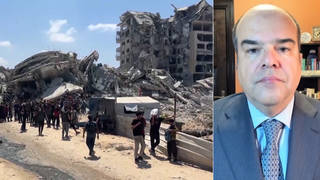
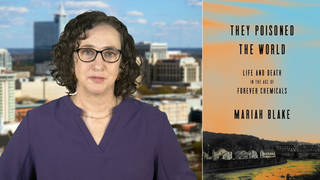

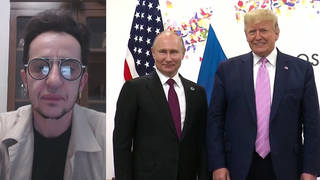





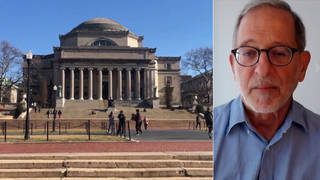

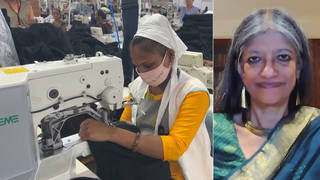
Media Options